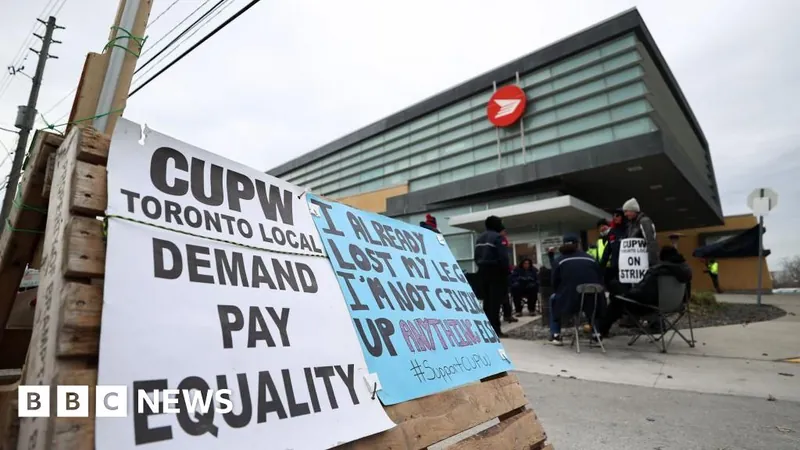
Canadian Government Steps In to Resolve Postal Workers' Strike Just in Time for the Holidays
2024-12-14
Author: Charlotte
Introduction
In a bid to resolve a nearly month-long strike that has significantly disrupted mail delivery across Canada, the federal government is taking decisive action as the holiday season approaches.
Government Intervention
On Friday, Labour Minister Steven MacKinnon announced that the Canadian Industrial Relations Board would be instructed to order Canada Post employees back to work if a resolution is not reached soon. This intervention marks a crucial turning point in a standoff that began on November 15, when approximately 55,000 postal workers initiated the strike over disputes related to pay and working conditions.
Reactions from Both Parties
With both parties unable to find common ground, federal mediators recently concluded that the gaps in negotiations were too wide to bridge. The Canadian Union of Postal Workers (CUPW) strongly condemned the government's directive, labeling it an attack on the workers' constitutional right to strike and collectively bargain.
In contrast, Canada Post expressed its eagerness to have employees return to work and resume approved postal services. The Crown corporation emphasized its commitment to negotiating with the union while simultaneously addressing the postal needs of Canadians during this critical period.
Impact of the Strike
The Canadian Industrial Relations Board is anticipated to make a ruling on Minister MacKinnon's request next week, and the impact of the strike has already been seen throughout the country. Businesses are suffering during one of the busiest shopping seasons of the year, with essential inventory stuck in warehouses and escalating shipping costs.
Lorne James, an Ontario business owner, voiced his concerns to the BBC, stating, "The strike is going to wipe out a good number of businesses due to steep financial losses." This sentiment resonates particularly in Canada’s remote northern regions, where Canada Post is often the only mail delivery option available, causing significant hardship for residents who depend on timely deliveries of vital items, including medications and cheques.
Consequences for Service Canada
Moreover, during the strike, Service Canada has paused the delivery of approximately 85,000 passports and other critical documents. Minister MacKinnon acknowledged the public fatigue over the ongoing strike, stating, "Canadians are rightly fed up,” and characterized his decision as a necessary measure under the circumstances.
Negotiation Stalemate
The government has requested that striking employees return to work under existing conditions until May 22, by which time a new agreement is expected to be finalized. In negotiations, the union is seeking a 19% wage increase over the next four years, exceeding Canada Post's initial offer of 11.5%. Other focal points in discussions involve improved benefits, better sick leave policies, job security, and overall workplace conditions.
Accusations and Tensions
CUPW national president Jan Simpson has accused Canada Post of deliberately stalling negotiations, allowing for government intervention, while Canada Post claims the union is increasing demands rather than working towards a resolution.
Future Implications
As the strike continues, Canada Post has warned customers that even post-agreement, services will remain disrupted due to the extensive backlog of deliveries, leading many customers to switch to private competitors during the strike. The previous major strike in October 2018 lasted over a month before the government mandated employees return to work, costing Canada Post an estimated C$135 million.
Conclusion
With the holiday season right around the corner, all eyes are on the Canadian government and postal services to find a resolution that balances workers' rights with the pressing needs of the public. Will a compromise be reached in time, or will this strike leave an unforgettable mark on Canada's holiday season? Stay tuned!









 Brasil (PT)
Brasil (PT)
 Canada (EN)
Canada (EN)
 Chile (ES)
Chile (ES)
 España (ES)
España (ES)
 France (FR)
France (FR)
 Hong Kong (EN)
Hong Kong (EN)
 Italia (IT)
Italia (IT)
 日本 (JA)
日本 (JA)
 Magyarország (HU)
Magyarország (HU)
 Norge (NO)
Norge (NO)
 Polska (PL)
Polska (PL)
 Schweiz (DE)
Schweiz (DE)
 Singapore (EN)
Singapore (EN)
 Sverige (SV)
Sverige (SV)
 Suomi (FI)
Suomi (FI)
 Türkiye (TR)
Türkiye (TR)